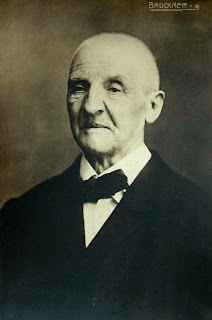Information
Composer: Anton Bruckner
Fitzwilliam Quartet
Lucy Russell, violin
Jonathan Sparey, violin (1-5)
Colin Scobie, violin (6-9)
Alen George, viola
Heather Tuach, cello
&
James Boyd, viola (1-5)
Date: 2010-2011
Label: Linn
http://www.linnrecords.com/recording-bruckner-quintet-quartet.aspx
- String Quintet in F major: I. Gemässigt
- String Quintet in F major: II. Scherzo: Schnell - Trio: Langsamer
- String Quintet in F major: III. Adagio
- String Quintet in F major: IV. Finale: Lebhaft bewegt
- Intermezzo in D minor
- String Quartet in C minor: I. Allegro moderato
- String Quartet in C minor: II. Andante
- String Quartet in C minor: III. Scherzo: Presto - Trio: Langsamer
- String Quartet in C minor: IV. Rondo: Schnell
Fitzwilliam Quartet
Lucy Russell, violin
Jonathan Sparey, violin (1-5)
Colin Scobie, violin (6-9)
Alen George, viola
Heather Tuach, cello
&
James Boyd, viola (1-5)
Date: 2010-2011
Label: Linn
http://www.linnrecords.com/recording-bruckner-quintet-quartet.aspx
----------------------------------------------------------------------------
Review
This first ‘period’ recording of Bruckner’s String Quintet may overturn some preconceptions. When writing it in 1879, the composer was still working through the contrapuntal mania to which he had given voice in the Fifth Symphony (completed immediately before beginning work on the Quintet), and there are modulating sequences in the first movement’s recapitulation that anticipate the Ninth’s finale, tied up in harmonic knots but jerked forward by the composer’s dotted rhythm of fate. The Fitzwilliams and James Boyd loosen the straitjacket and give these episodes the space they need. The relaxed swing they bring to the Scherzo and Trio recalls the Fifth like no previous recording: both movements sit back and watch the fun like a doctor of philology in the corner of a beer garden. The quality of patience prized by Robert Simpson in Bruckner is honoured by the Fitzwilliams, at least until the codas of the outer movements, where they push on to skirt the trappings of symphonic grandiloquence to which the piece is just occasionally prone.
In a long and useful booklet-note, Alan George, the quartet’s founding viola player, lays out their performing principles, which (guess what?) in practice come back round to share the pitch and spacious confidence of the Amadeus Quartet, with important differences: more vocally inflected portamento (revealing the ‘surprisingly modern operatic dimension’ of the work: John Williamson in the CUP Bruckner Companion) and less vibrato, though there is enough of it in Lucy Russell’s first violin to let the glorious main theme of the Adagio take wing.
The Intermezzo (an unused replacement for the quintet’s Scherzo) and early quartet (effortfully imitated Schubert and Mendelssohn) are no less stylishly done, but the Quintet should find new friends for Bruckner and for what Russell shrewdly values as the ‘sense of unravelling time and space’ to be treasured in his music.
-- Peter Quantrill, Gramophone
More reviews:
http://www.musicweb-international.com/classrev/2015/Oct/Bruckner_chamber_CKD402.htm
http://www.allmusic.com/album/anton-bruckner-string-quintet-string-quartet-mw0002879105
http://www.amazon.com/Bruckner-String-Quintet-Quartet/dp/B0072IVGLK
----------------------------------------------------------------------------

Anton Bruckner (4 September 1824 – 11 October 1896)) was an Austrian composer. His symphonies are considered emblematic of the final stage of Austro-German Romanticism because of their rich harmonic language, strongly polyphonic character, and considerable length. Bruckner composed eleven symphonies, scored for a fairly standard orchestra. His orchestration was modeled after the sound of his primary instrument, the pipe organ.
http://en.wikipedia.org/wiki/Anton_Bruckner
http://en.wikipedia.org/wiki/Anton_Bruckner
***
Founded in 1968 by four Cambridge undergraduates, the Fitzwilliam Quartet was one of the first of a long line of quartets to have emerged under the guidance of Sidney Griller at the Royal Academy of Music. They became well known through their close personal association with Dmitri Shostakovich, who befriended them following a visit to York to hear them play.
https://en.wikipedia.org/wiki/Fitzwilliam_Quartet
http://www.fitzwilliamquartet.org/
Founded in 1968 by four Cambridge undergraduates, the Fitzwilliam Quartet was one of the first of a long line of quartets to have emerged under the guidance of Sidney Griller at the Royal Academy of Music. They became well known through their close personal association with Dmitri Shostakovich, who befriended them following a visit to York to hear them play.
https://en.wikipedia.org/wiki/Fitzwilliam_Quartet
http://www.fitzwilliamquartet.org/
----------------------------------------------------------------------------
FLAC, tracks
Links in comment
Enjoy!


MEGA
ReplyDeletehttp://adf.ly/1YdyBL
gracias desde Argentina!
ReplyDeleteMuch thanks!
ReplyDeleteMany thanks for these rarely heard works!
ReplyDeleteThank you!
ReplyDelete¡Muchísimas gracias...!
ReplyDeleteSalud, paz, sonrisas y muy cordiales saludos.
Elgatosierra :)